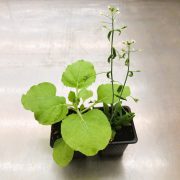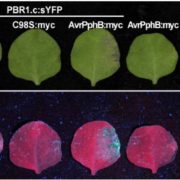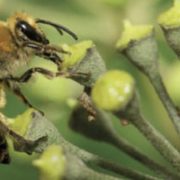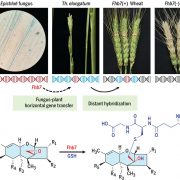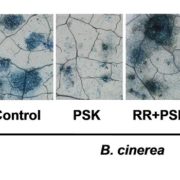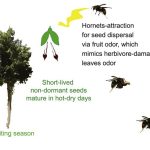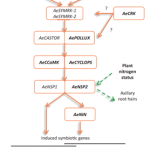Identification of a cell signaling cascade that regulate s broad-spectrum resistance (Cell Reports)
 Many different pathogens attack plants, and many genes have been identified that confer pathogen-specific resistance. In a recent study, Hao et al. identified a signaling cascade that regulates broad-spectrum disease resistance. This pathway is composed of a rice ubiquitin ligase OsPUB73, a VQ motif-containing protein OsVQ25, and a transcription factor OsWRKY53. As is characteristic of VQ-motif proteins, OsVQ25 interacts with OsWRKY53 and through this interaction suppresses OsWRKY53-mediated induction of defense genes. Upstream, OsPUB73 interacts with OsVQ25 and causes its proteasomal degradation. The authors showed that OsPUB73 is positive regulator of broad-spectrum immunity, as knockout plants are more susceptible to both the blight bacterium Xanthomonas oryzae pv. oryzae (Xoo) and the rice blast fungus Magnaporthe oryzae. By contrast, OsVQ25 is a negative regulator of immunity, as enhanced resistance against both pathogens was observed in osvq25 mutants. Additionally, this enhanced broad-spectrum resistance comes without any observable effects on major agronomic traits such as plant height, kernels per spike, or grain weight. Apparently, induction of immunity involves OsPUB73-mediated degradation of OsVQ25 leading to the release of OsWKRY53 to enhance expression of defense-related genes. Summary by Kamal Kumar Malukani, @KamalMalukani. Cell Reports, 10.1016/j.celrep.2022.111235
Many different pathogens attack plants, and many genes have been identified that confer pathogen-specific resistance. In a recent study, Hao et al. identified a signaling cascade that regulates broad-spectrum disease resistance. This pathway is composed of a rice ubiquitin ligase OsPUB73, a VQ motif-containing protein OsVQ25, and a transcription factor OsWRKY53. As is characteristic of VQ-motif proteins, OsVQ25 interacts with OsWRKY53 and through this interaction suppresses OsWRKY53-mediated induction of defense genes. Upstream, OsPUB73 interacts with OsVQ25 and causes its proteasomal degradation. The authors showed that OsPUB73 is positive regulator of broad-spectrum immunity, as knockout plants are more susceptible to both the blight bacterium Xanthomonas oryzae pv. oryzae (Xoo) and the rice blast fungus Magnaporthe oryzae. By contrast, OsVQ25 is a negative regulator of immunity, as enhanced resistance against both pathogens was observed in osvq25 mutants. Additionally, this enhanced broad-spectrum resistance comes without any observable effects on major agronomic traits such as plant height, kernels per spike, or grain weight. Apparently, induction of immunity involves OsPUB73-mediated degradation of OsVQ25 leading to the release of OsWKRY53 to enhance expression of defense-related genes. Summary by Kamal Kumar Malukani, @KamalMalukani. Cell Reports, 10.1016/j.celrep.2022.111235


